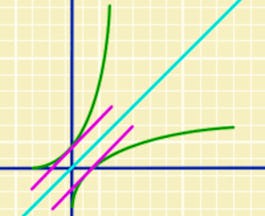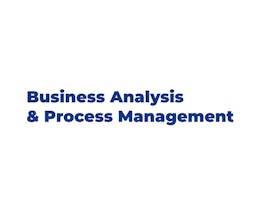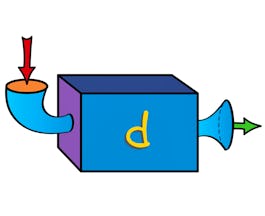Filter by
The language used throughout the course, in both instruction and assessments.
Explore the Business Calculus Course Catalog
 Status: Free
Status: FreeThe University of Sydney
Skills you'll gain: Algebra, Calculus, Mathematical Theory & Analysis, Mathematics, Problem Solving, Computational Logic, Critical Thinking, Differential Equations, Plot (Graphics), Linear Algebra

Coursera Project Network
Skills you'll gain: Business Analysis, Business Process Management

University of Pennsylvania
Skills you'll gain: Accounting, Finance, General Accounting, Decision Making, Financial Accounting, Strategy and Operations, Account Management, Accounts Payable and Receivable, Cost Accounting, Leadership and Management, Strategy, Cash Management, Communication, Financial Analysis, Generally Accepted Accounting Principles (GAAP), Marketing, Brand Management, Budget Management, Customer Analysis, Market Analysis, Marketing Design, Product Marketing, Product Strategy, Entrepreneurship, Human Resources, People Analysis, Performance Management, Customer Relationship Management, Data Analysis, Sales, Change Management, Organizational Development, People Management, Talent Management, Planning, Operations Management

University of Illinois Urbana-Champaign
Skills you'll gain: Market Analysis, Finance, Business Analysis, Financial Analysis, Data Analysis, Behavioral Economics, Decision Making, Econometrics, Probability & Statistics, Accounting, Banking, General Statistics, Statistical Analysis, Leadership and Management, Basic Descriptive Statistics, Exploratory Data Analysis, Financial Accounting, Financial Management, Strategy and Operations, Investment Management, Probability Distribution, Regulations and Compliance, Marketing, Risk Management, Securities Trading, Statistical Tests, Correlation And Dependence, Securities Sales, Strategy, Taxes, Game Theory, Regression, Microsoft Excel
 Status: Free
Status: FreeUniversity of Pennsylvania
Skills you'll gain: Algebra, Calculus, Mathematics, Differential Equations, Mathematical Theory & Analysis, Problem Solving, Linear Algebra
 Status: Free
Status: FreeLund University
Skills you'll gain: Leadership and Management, Strategy, Algorithms, Human Computer Interaction, Human Resources, Machine Learning, Machine Learning Algorithms, Business Process Management, Human Learning, Machine Learning Software, Training

University of Pennsylvania
Skills you'll gain: Business Analysis, Data Analysis, Finance, General Statistics, Probability & Statistics, Financial Analysis, Statistical Analysis, Forecasting, Mathematics, Spreadsheet Software, Statistical Tests, Basic Descriptive Statistics, Data Model, Mathematical Theory & Analysis, Risk Management, Correlation And Dependence, Probability Distribution, Decision Making, Investment Management, Accounting, Leadership and Management, Regression, Financial Accounting, Microsoft Excel, Linear Algebra, Performance Management, Cash Management, General Accounting, Cost Accounting, Operational Analysis, Computer Programming
 Status: Free
Status: FreeUniversity of Pennsylvania
Skills you'll gain: Mathematics, Calculus, Mathematical Theory & Analysis, Differential Equations, Problem Solving

Microsoft
Skills you'll gain: Leadership and Management
 Status: Free
Status: FreeUniversity of Pennsylvania
Skills you'll gain: Calculus, Mathematics, Differential Equations, Algebra, Mathematical Theory & Analysis

University of Pennsylvania
Skills you'll gain: Machine Learning, Machine Learning Algorithms, Applied Machine Learning, Data Analysis, Algorithms, Human Learning, Leadership and Management, Business Analysis, Decision Making, Human Resources, People Management, People Analysis, Artificial Neural Networks, Business Transformation, Customer Analysis, Deep Learning, Finance, Financial Accounting, Marketing, Probability & Statistics, Regulations and Compliance, Statistical Machine Learning, Strategy, User Experience, Big Data

University of Pennsylvania
Skills you'll gain: Data Analysis, Business Analysis, Probability & Statistics, Statistical Analysis, Leadership and Management, Strategy and Operations, Basic Descriptive Statistics, Exploratory Data Analysis, Financial Analysis, Forecasting, Data Model, Mathematics, Performance Management, Strategy, Accounting, Customer Analysis, Human Resources, Human Resources Operations, Market Analysis, Market Research, Marketing, Mathematical Theory & Analysis, Operations Management, Operations Research, Organizational Development, People Analysis, People Management, Spreadsheet Software, Talent Management, Financial Accounting, Collaboration, Finance, Regulations and Compliance
In summary, here are 10 of our most popular business calculus courses
- Introduction to Calculus: The University of Sydney
- Business Analysis & Process Management: Coursera Project Network
- Business Foundations: University of Pennsylvania
- Managerial Economics and Business Analysis: University of Illinois Urbana-Champaign
- Calculus: Single Variable Part 2 - Differentiation: University of Pennsylvania
- AI, Business & the Future of Work: Lund University
- Business and Financial Modeling: University of Pennsylvania
- Single Variable Calculus: University of Pennsylvania
- Business Analysis Fundamentals: Microsoft
- Calculus: Single Variable Part 3 - Integration: University of Pennsylvania










